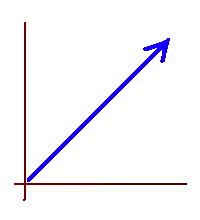A variable does not have a sign of its own. Numbers have signs of their own. Variables represent numbers. Variables may come with different signs in front of them in any particular expression. Still the number represented by the variable has a sign of its own. That is why sometimes I tell to some of my students: "Variables have an inner sign," which we cannot determine from outside just by looking at the sign in front of that variable in a particular expression or formula. I am not talking about astrological signs here but about the tendency some students show to assume a number represented by x in an expression has to be negative just because in that expression there is a negative sign in front of x. Don't go only by the sign in front of the variable to determine whether the number represented by that variable is positive or negative. In most cases we start working on the problem without knowing the value of the variables. At the beginning we don't know whether x is going to end up being positive or negative. Until you find the exact numerical value of that variable, we don't know if it's positive or negative. It can turn out either way, regardless of the sign that is showing "on the outside," in the expressions the variable appears in. For example:
If 7 + x = 4, then x = -3 (a negative number), even though the sign in front of x in the original equation is "+"
If 7 - x = 2, then x = 5 (a positive number), even though the sign in front of x in the original equation is "-"
These are very simple examples but you would be surprised to see how often people make assumptions or jump to conclusions about the mathematical properties of the numbers represented by variables, based only on lexicographic features of the algebraic expressions the variables appear in. In other words, very often students think they know things about the numerical value of a variable based only on how the variable itself looks like when surrounded by all the other symbols in an expression. People do this even in the case of very complex expressions. In general the more complex an expression is, the more reasoning time and effort it will take to infer the exact values of the variables involved, or just to determine some of their properties.
Imagine your friend is telling you a story where at some point they mention their doctor's mother. You wouldn't assume their doctor is a female person just because the noun "mother" is female, and the only time at which your friend mentioned their doctor was in connection with that doctor's mother. Would you?





No comments:
Post a Comment